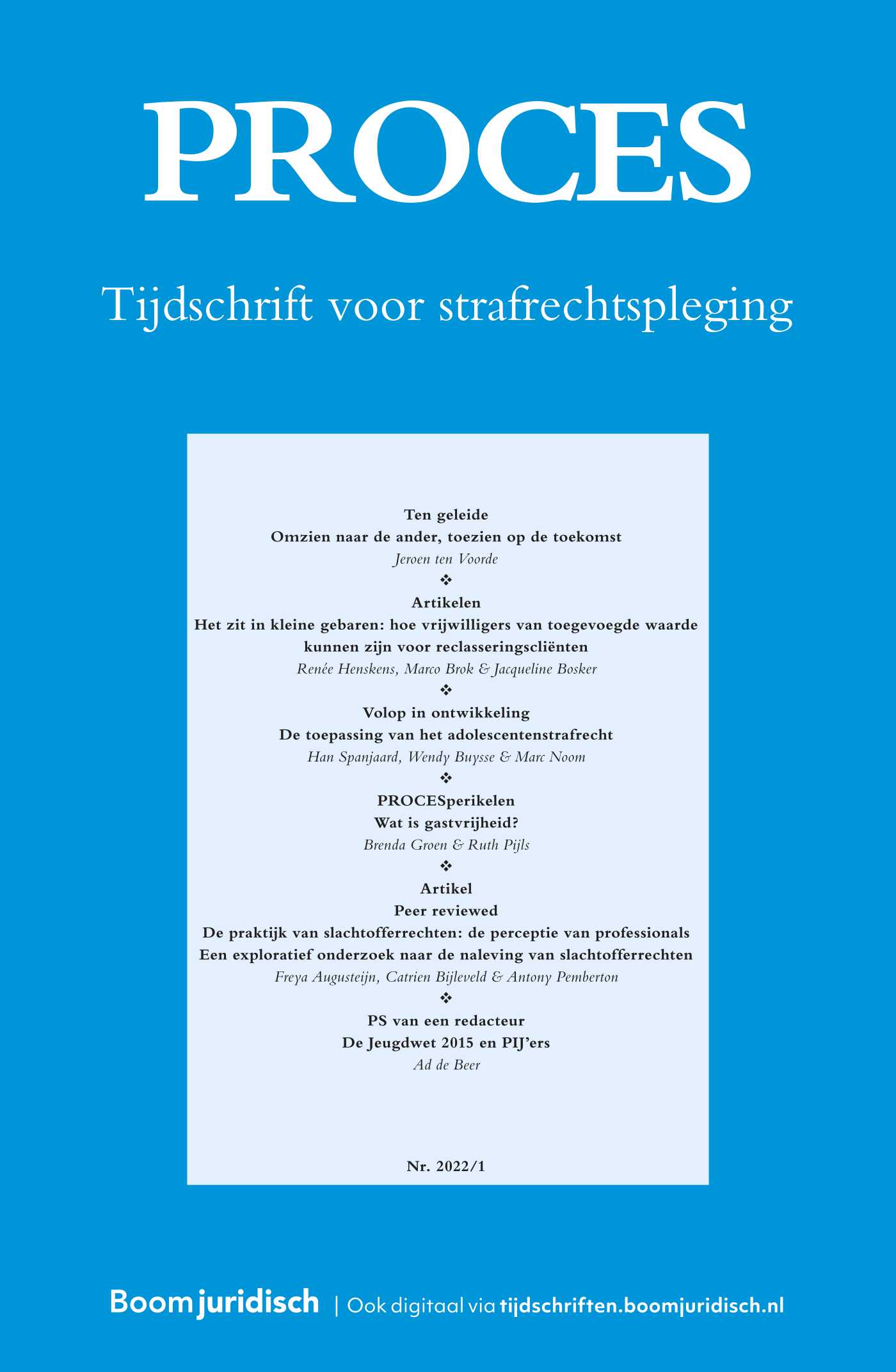|
Approximately a third of all probation supervision programs is imposed to young adults (18 to 25 years). Literature research shows that young adulthood can be viewed as a separate (developmental) age category. Quantitative analysis of data from the Dutch Probation Service provides some evidence for young adults being a special offender group. Some outcomes cause concerns, e.g. higher absconding rates from supervision and higher re-offending rates. The article discusses these findings and the need for a separate or customized approach as claimed by Probation Service. |


PROCES
Meer op het gebied van Criminologie en veiligheid
Over dit tijdschriftMeld u zich hier aan voor de attendering op dit tijdschrift zodat u direct een mail ontvangt als er een nieuw digitaal nummer is verschenen en u de artikelen online kunt lezen.
| Redactioneel |
Lessen voor Rutte I |
| Auteurs | Miranda Boone |
| Artikel |
Reclasseringstoezicht en jongvolwassenen |
| Trefwoorden | Reclassering, Toezicht, Interventies, Jongvolwassenen |
| Auteurs | Willemijn Lamet, Chrissy James, Dr. Anja Dirkzwager e.a. |
| SamenvattingAuteursinformatie |
| Artikel |
Burgemeesters beter voorbereid |
| Trefwoorden | Informatievoorziening, Burgemeesters, Ex-gedetineerden |
| Auteurs | Mr. drs. Ad Schreijenberg en Drs. Joost van den Tillaart |
| SamenvattingAuteursinformatie |
|
The Dutch Minister of Justice has promised that a city’s mayor will be informed if a former prisoner, who was sentenced for a sex offense and/or serious violent crime, returns to the municipality. Because of an improved information position, the mayor is able to take founded and timely measures in order to prevent disturbances in public safety. To determine how this information can be organised in the best way, a pilot was carried out. The evaluation of this pilot suggests that the information meets a need, but that the information processing is vulnerable in certain parts. Following the evaluation the process will be adapted and may be rolled out nationwide. |
| Artikel |
Efficiëntie in het kwadraatOver de lotgevallen van de kleine strafzaak na invoering van de strafbeschikking en het verlofstelsel |
| Trefwoorden | strafbeschikking, verlofstelsel, decriminalisering, efficiëntie in het strafproces |
| Auteurs | Mr. dr. Jan Crijns |
| SamenvattingAuteursinformatie |
|
Recently, the punishment order by the prosecutor (article 257a Code of Criminal Procedure) and the leave to appeal system (article 410a Code of Criminal Procedure) have been adopted in Dutch criminal procedural law. Both legal measures have major consequences for the way in which minor criminal offences are dealt with. Viewing both these efficiency-promoting measures from their mutual interconnection, the question rises whether, in the settlement of these minor offences, a full process that actually does justice to all interests involved, may still be spoken of. It is suggested in this contribution that this question requires a more subtanstial revision and reassessment of the enforcement system with regards to minor offences, whereby decriminalisation may also play a pertinent role. |
| Praktijk |
‘U moet niet schrikken, maar ik zing: fuck you ...’ |
| Auteurs | Marjolein Rietbergen |
| Auteursinformatie |
| Artikel |
De Europese Reclasseringsregels: goed dat ze er zijn, voor Europa en voor Nederland |
| Auteurs | Leo Tigges |
| SamenvattingAuteursinformatie |
|
In this article the significance and impact on Europe and The Netherlands of the European Probation Rules are discussed. As opposed to Gerard de Jonge the author contends that the Rules are also important to and have impact on the Dutch situation. The CEP, The European Organisation for Probation will undertake several activities to assist the member states in implementing the Rules and will contribute to a future revision of the present Rules. |
| Artikel |
De relatie tussen subtypen relationeel geweldplegers en de adviezen van de reclassering |
| Trefwoorden | Relationeel geweld, Subtypen, B-SAFER, Reclassering |
| Auteurs | Drs. Jill Thijssen en Prof. dr. Corine de Ruiter |
| SamenvattingAuteursinformatie |
|
In the present study, the B-SAFER was coded for 146 files of spousal assault cases from the Dutch probation service. The aim of the study was twofold: (1) identifying subtypes of spousal assaulters and (2) examine the relationship between the subtypes found and the advice the probation officers gave to court. Four subtypes of assaulters were identified: family-only, generally violent/antisocial, low-level antisocial, and psychopathology. There was only a significant relationship between the subtypes and the advice on two of the ten advices. The type of advice showed a strong relationship with the region of the probation offices where the batterer was examined. |
| Column |
Strafrechter en forensische zorg |
| Auteurs | Jeannette Bruins |
